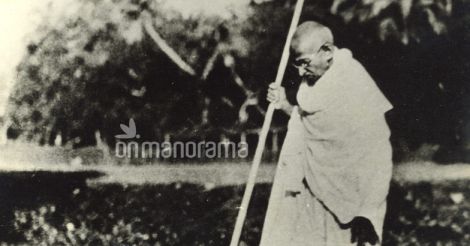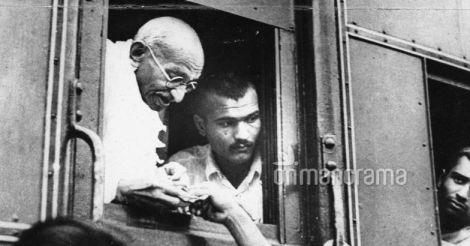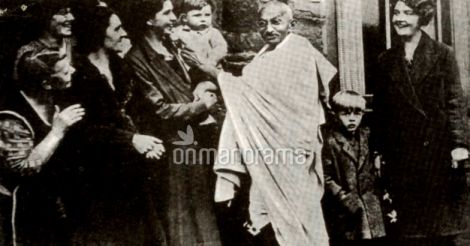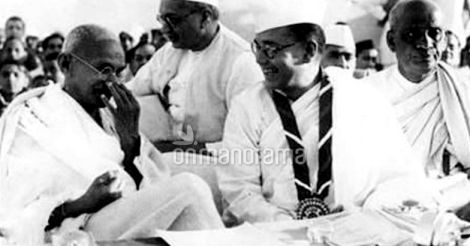Seventy years after Independence, we think the Mahatma's greatest achievement was that he got us freedom from an exploitative colonial rule. But the current narrow definition of that achievement has offered the space to question Mohandas Gandhi's legacy and even cast doubts on his motives.
Many think India could have achieved freedom without Gandhi, and that he maneuvered to edge out of the political space those who did not agree to his view of how the struggle had to be essayed. Like, for example, Netaji Subhas Bose. That, they think cast a cloud on his greatness.
But expand the the scope of the definition of Gandhi's achievement only a little more and you will see his greatness shining through, perhaps eclipsing everyone else who could have had a better claim to greatness in getting Indians their freedom.
I think we should respect Gandhi not for the fact that he got us our freedom but for the way he fought that battle. For, given the time and space, Netaji or some other leader too would have brought India out of the colonial yoke through their own methods.
 Mahatma Gandhi. Onmanorama/File
Mahatma Gandhi. Onmanorama/FileBut Gandhi's greatness lies in the fact that he crafted a struggle for freedom that avoided needless bloodshed, suffering and collateral damage. Colonial powers, even in the mid-1900s were loathe to give up their possessions. They unleashed bloody violence and repression on those who fought for their freedoms, often justifying those human rights violations and torture with ideological labeling.
Vietnam, whose struggles came much after Gandhi, is a great example. Even the low estimates say the Vietnam war, set off by the French colony's attempt to gain freedom, cost a whopping 14.5 lakh lives. And no one can quantify the untold suffering the people of that country and neighboring regions were subjected to -- the orphaned children, separated and uprooted families, generations that grew up in a culture of violence and destruction.
But Gandhi helped India, to a large extent, avoid that suffering. It is another matter that hunger for power and religious bigotry brought on the country the terrible blight of partition, but those forces were too powerful even for Gandhi – whose focus was freedom – to control.
Gandhi's greatness lies undoubtedly in his vision to craft a freedom struggle that eschewed violence, to the point of making non-violence the underpinning of his politics, and his own life. And he kept a tight leash on his struggle, ensuring that the outpouring of emotions did not lead to violence. That kind of careful calibration is so beautifully evident in how the Mahatma went on a five-day fast of penance when a violent crowd of protesters burnt to death 23 policemen in Chauri Chaura. And then he called off the non-cooperation movement.
 Mahatma Gandhi is seen during a train journey. Onmanorama/File
Mahatma Gandhi is seen during a train journey. Onmanorama/FileGandhi's followers got his message – probably without knowing its import – and kept largely to within the limits he set for his struggle after that.
Yes, his struggle it was. To give his method of Satyagraha and non-violence credibility, he had to turn his own life and body into a lab. He used those methods to tap into the inherent religiosity and goodness of the Indian masses, successfully appealing to them across religious divides. And they were awed by his way of leading through example, unlike the lesser leaders who preached but never practiced.
For the everyman, Gandhiji's principle of ahimsa is a lot tough to get his head around. Suffer the injustice of the occupiers and show the other cheek to them when they slap you? Counter-intuitive, isn't it? Doesn't that just reaffirm the occupier's superiority once more, and the slavishness of the colonial subject's position?
But Gandhi asked Indians to do that. And many did just that. It worked the way the Mahatma wanted. The British were baffled as to how to deal with this phenomenon of a man. There were of course people like General Dwyer who committed the Jallianwala Bagh massacre, but many British politicians and officers could not bring themselves to unleash unbridled violence on the peaceful Satyagrahis. Gandhi was already winning and it was only a matter of time.
His greatest challenge was probably in managing this time element: people were getting impatient and there was every danger of him losing control of the struggle's direction. His real greatness probably lies in successfully managing this grind, managing the expectations, and the conflicting agendas among his own leaders. But manage he did till he achieved his aim – probably his Satyagraha and ascetic life gave him the moral and physical endurance, but that is another story.
 Mahatma Gandhi with a group of British women when he visited Britain. Onmanorama/File
Mahatma Gandhi with a group of British women when he visited Britain. Onmanorama/FileOne can say Gandhi could succeed because the British themselves were being guided by a new moral paradigm, one that looked at enslavement and colonialism with disgust. Well, look at how the same British treated INA veterans. The INA men, and communist revolutionaries, challenged British armed might and were subjected to its crushing force. The prisoners were ill-treated and subjected to harsh punishments. The same white politicians and officers who treated Gandhi with respect and held back from using crushing force, did not think twice about destroying the INA, and after its defeat, taking out their vendetta on the prisoners of war.
The Mahatma's strategy saved the people of India from the suffering that the subjects of other colonial domains had to go through for their freedom. It saved generation of Indians from a dark destiny, the horrors of war and hunger. That was his greatness.
Nelson Mandela tried the same strategy decades later in South Africa, and won. But Gandhi was the first leader to think up and employ this philosophy and strategy. Unlike South Africa, Gandhi's struggle did not have the blessing and support of many western governments. And his own life was the underpinning of the his struggle. There was nothing that he told his followers to do that he himself did not practice. Rarely will you find such a man in human history, much less in political history.
Don't you think India needs another Gandhi now, to get rid of the lesser politicians who do not practice what they preach and see the people as mere cannon fodder in their quest for power and riches?
(The views expressed are personal.)

























 Mahatma Gandhi with Subhas Chandra Bose (center) and Vallabhai Patel (right). Onmanorama/File
Mahatma Gandhi with Subhas Chandra Bose (center) and Vallabhai Patel (right). Onmanorama/File